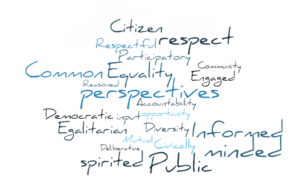Deliberative Democracy
Public Engagement and Democratic Deliberation
in Health and Healthcare

The idea that ordinary people and patients should have a voice in health research, policy, and practice is now widely accepted in the US and abroad. Participatory processes vary in name and method, but all share key democratic and egalitarian aspirations. They seek to involve people of diverse backgrounds and experiences in setting priorities, informing research and policy, designing systems, and disseminating results—all aimed at more effective and equitable healthcare and health for all.
Participatory processes have a long history in public health and primary care, dating back to the 1978 Alma Ata Declaration, which formalized public participation as a guiding principle of health promotion and clinical services. Today, processes as varied as patient-centered outcomes research, community advisory boards, and community-based participatory research are institutionalized within the structures and funding mechanisms of public health and healthcare.
Democratic Deliberation
Dr. Blacksher explains democratic deliberation in this video.
More recently, a participatory process called democratic deliberation – also known as public deliberation – has recently taken root in the US health sector. Deliberative engagement has been increasingly used over the past two decades to bring informed public perspectives into policy debates about, for example, health reform, resource allocation, pandemic planning, biotechnology, and genomic research.
Although there is no consensus on the definition of deliberative engagement, in general “public deliberation engages ordinary citizens with diverse perspectives in reasoned and respectful discussion about important social issues in search of well-informed proposals that deliberators will view as legitimate” (Blacksher E, et al. 2012; see also Burkhalter et al. 2010). A controlled trial of deliberative methods conducted by the Agency of Healthcare Research and Quality showed that deliberation increases knowledge among diverse participants, impacts deliberants’ reasoning, and is valued by participants, particularly members of racial and ethnic minority groups and those with lower levels of education (Carman KL, et al. 2015, Wang G, et al. 2015).
In September 2021, using the tools of civic engagement and population health science, the Center initiated the first stage of a new initiative:

Current Projects
The Center for Practical Bioethics’ newly appointed John B. Francis Chair,
Erika Blacksher, PhD, brings a decade of scholarship and practical experience in democratic deliberation to the Center and Kansas City. In addition to contributions to scholarly discourse on democratic deliberation (see CV),
Dr. Blacksher has led the design and implementation of democratic deliberations for several NIH-funded studies and is a consultant to the NIH-funded Center for the Ethics of Indigenous Genomic Research (CEIGR) at the University of Oklahoma, collaborating with CEIGR and tribal leadership to design and implement face-to-face and online deliberations about genomic research, data governance, and biobanking for tribal communities.
During Spring and Summer 2021, Dr. Blacksher served on a National Academy of Science, Engineering and Medicine (NASEM) committee to plan a workshop held on June 14-15 titled, “Civic Engagement and Civic Infrastructure to Advance Health Equity.” With some 500 people participating, the workshop explored the relationships between civic and political engagement and health.
Dr. Blacksher worked with her colleagues to design the workshop’s concluding activity, a “mini-deliberation” in which a subset of participants weighed in on the question: “Which civic infrastructure investments are most important to advance health equity?”
Dr. Blacksher also gave several talks this Spring on democratic deliberation, for example, speaking about the imperative of meaningful public participation in pandemic planning and response for the National Hispanic Council on Aging, and about deliberative methodology to the Stakeholder Engagement Workgroup of the NIH-funded Clinical Sequencing and Evidence Generating Research Consortium about using democratic deliberative engagement for dissemination planning.
During Fall 2020 and Winter 2021, Dr. Blacksher was involved in a series of five online public deliberations about the equitable distribution of Covid-19 vaccines—a collaboration between the New York Academy of Medicine and the New York City Department of Health and Mental Hygiene that sought informed input from a cross-section of New Yorkers regarding which types of essential worker occupations should gain priority for vaccination. Dr. Blacksher developed and delivered an expert presentation on various ways to think about distributive fairness.
Dr. Blacksher gained firsthand experience in public participation at the Center for Practical Bioethics between 1998 and 2002, where she was the Deputy Director of an $11 million Robert Wood Johnson Foundation project, Community-State Partnerships to Improve End-of-Life Care. She worked closely with then Center CEO and the project’s Director, Myra Christopher, to provide technical assistance to 21 statewide coalitions seeking to build civic and policy environments supportive of good end-of-life care. She looks forward to expanding on the Center’s 35-year history of community-engaged bioethics with her expertise in civic engagement and democratic deliberation.
- Blacksher E, Diebel A, Forest PG, Goold SD, Abelson J. What Is Public Deliberation? Hastings Center Report, 2012;42(2):14-7.
- Burkhalter S, Gastil J, Kelshaw T. A Conceptual Definition and Theoretical Model of Public Deliberation in Small Face—to—Face Groups. Communication Theory, 2002;12(4):398-422.
- Carman KL, Mallery C, Maurer M, Wang G, Garfinkel S, Yang M, Gilmore D, Windham A, Ginsubrg M, Sofaer S, Gold M, et al. Effectiveness of Public Deliberation Methods for Gathering Input on Issues in Healthcare: Results from a Randomized Trial. Social Science & Medicine, 2015; 133: 11-20.
- Wang G, Gold M, Siegel J, Yang M, Mallery C, Carman KL. Deliberation: Obtaining Informed Input from a Diverse Public. Journal of Health Care for the Poor and Underserved, 2015;26(1): 223-242.
Recieve More Information
Our Programs
Make an impact
Every dollar you give helps providers, clinicians, patients and families decide what to do when it’s hard to agree about the “right” thing to do.








